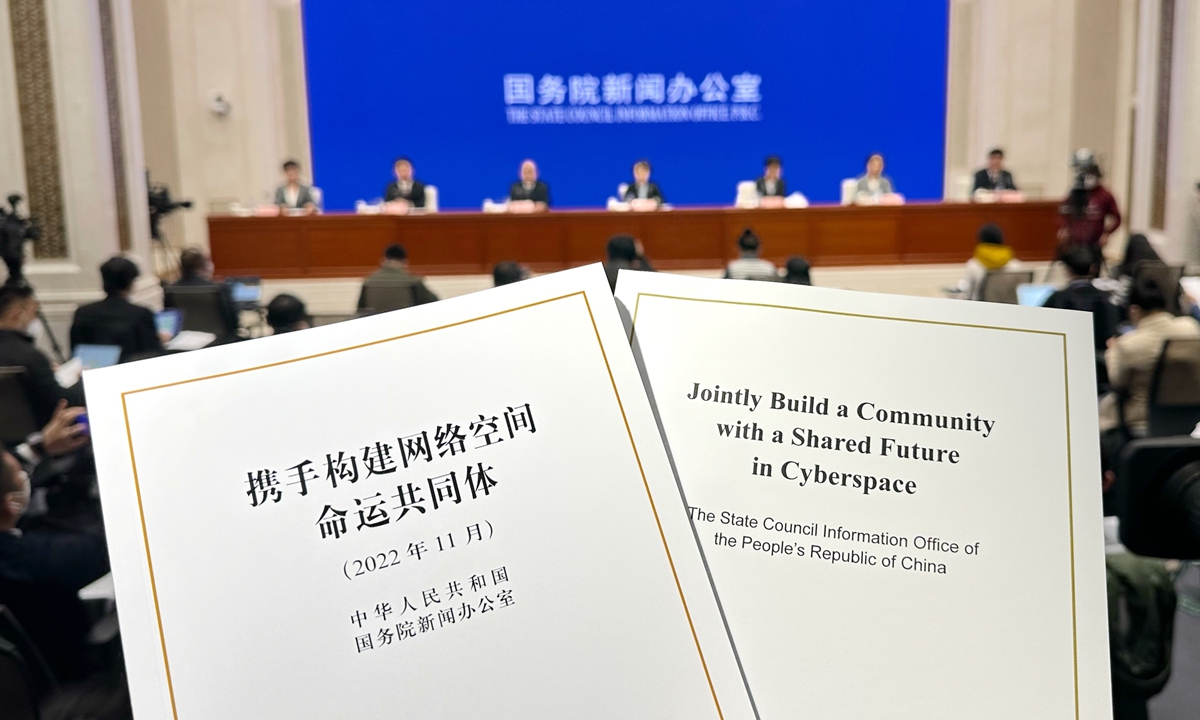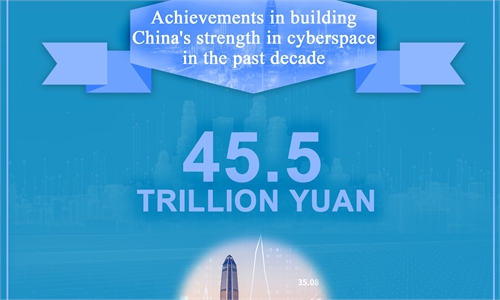White paper details China's wisdom in cyberspace governance, safeguards each country's cyberspace path and interests

China's State Council Information Office issued the white paper titled "Jointly Build a Community with a Shared Future in Cyberspace" during a press conference on November 7, 2022, in Beijing. Photo: VCG
China on Monday issued a white paper on building a community with a shared future in cyberspace, which introduced China's vision of internet development and governance in the new era and its actions, and outlined the prospects for international cooperation.
A Chinese cyberspace official stressed that the paper was fundamentally different from the US' proposition on cyberspace, which tries to create division and confrontation through ideology and contain China's development.
China's State Council Information Office issued the white paper titled "Jointly Build a Community with a Shared Future in Cyberspace" during a press conference on Monday in Beijing, which detailed the achievements of China's internet development and governance practices over the past decade and put forward the Chinese proposition of building a community with a shared future in cyberspace.
The white paper provides a complete outline of China's plans and wisdom for the world to better govern cyberspace, safeguard each country's own development rights and interests, and realize each country's data security and network development, Chinese experts said.
As the world's largest developing country and the country with the largest number of internet users, China "understands the underlying trends of the information age; upholds a people-centered approach; and supports global governance based on extensive consultation, joint contribution, and shared benefits," read the paper.
China is set to build up its strength in cyberspace and digital technologies, said the white paper, noting that progress has been made in boosting the digital economy, building a clean and sound online environment, and guarding against risks to cyberspace security.
By 2021, the value of China's digital economy had reached 45.5 trillion yuan, accounting for 39.8 percent of its GDP, said the white paper.
By June 2022, there were 1.05 billion internet users in China, and the internet penetration rate had reached 74.4 percent, read the white paper, adding that the country hosts the world's largest 5G network and has become one of the global leaders in 5G standards and technology, with 1.85 million 5G cell towers and 455 million 5G cell phone subscribers.
In 2021, China's online retail sales of consumer goods stood at 10.8 trillion yuan, up 12 percent year-on-year, said the white paper. The turnover in China's cross-border e-commerce reached 1.92 trillion yuan, up 18.6 percent year-on-year, according to the white paper.
While using the internet to eradicate poverty, China has also used technology to help developing countries improve broadband access in the poorest areas and areas with low population density. It has worked to provide universal and affordable internet access in the least developed countries, in order to eradicate poverty caused by lack of network facilities, according to the white paper.
China has actively developed digital public products and expanded cooperation in digital public services. Since the global outbreak of COVID-19, pandemic forecasting platforms and robocalls developed in China have helped with control and mitigation in other countries, read the white paper.
The white paper also highlighted the fact that China respects the rights of individual countries to independently choose their own path of cyber development, model of cyber regulation, and internet public policies, and their right to equal participation in international governance of cyberspace.
During the press conference highlighting the necessity of the white paper, Chinese officials said that with problems of unbalanced development, unsound rules and unreasonable order in cyberspace becoming increasingly prominent and cyber hegemony posing a new threat to world peace and development, effective solutions and joint efforts are needed to address the problems.
China's white paper is fundamentally different from the US and its partners' joint release in April titled "Declaration for the Future of the Internet," said Qi Xiaoxia, director general of the Bureau of International Cooperation of the Cyberspace Administration, at the press conference.
The declaration attempts to impose its own standards on others, draw ideological lines in cyberspace, draw "small circles," create division and confrontation, and violate international rules, Qi said. These actions have seriously undermined the unity of the internet family and seriously affected the stable development of the global internet.
The title of the paper "Jointly Build a Community with a Shared Future in Cyberspace" precisely shows China's wisdom in cyberspace. This is destined to form a sharp difference with the cyberspace strategy of the US, which pursues hegemony as the core and the strategy of the European Union which pursues the absolute protection of individual privacy, Shen Yi, director of the Research Institution for Global Cyberspace Governance at Fudan University, told the Global Times on Monday.
The US' discrediting and attacking the so-called "Chinese cyber threat" in recent years revealed its underlying concern over the appeal of the Chinese model to other countries. But so far, unlike the US, China has never forced the export of its practice on cyberspace governance, and any country that is willing to learn from the Chinese experience is doing so because of mutual benefit, Shen stressed.
Another cyberspace expert, who requested anonymity, told the Global Times on Monday that the biggest factor that may affect the stability of cyberspace at present is the US. Due to the complexity of the digital space, the US, with its geopolitical thinking, has hyped the competition in cyberspace, making it the focus of the strategic game among countries, which intensifies the anxiety in the international community, the expert said.
Amid the cyberspace competition led by the US, Western countries have conducted a large number of cyberattacks against targets in China. For example, a "concealed and adaptable" weapon used by US' intelligence center National Security Agency (NSA) to launch a cyberattack on the email system of Northwestern Polytechnical University in Northwest China's Shaanxi Province - well-known for its aviation, aerospace and navigation studies - was intercepted by Chinese cybersecurity experts, the Global Times learned from a source in September.
Also, contrary to China's vision of mutual benefit, under US pressure, there are many restrictions on the development of Chinese companies in some countries when they actively explore the international market.
Using the pretext of "national security," certain countries have abused export control measures to maliciously block and suppress Chinese enterprises, which undermines the legitimate rights and interests of Chinese enterprises and causes serious disruptions to the stability of the global industry chain and supply chain, Qi said.
It is also clearly stated in China's latest white paper that the Chinese government opposes politicization of technical issues and abuse of state power to suppress and curb other countries' enterprises of any kind, as this is in violation of market economy principles and international economic and trade rules.
In addition, during Monday's press conference, Qi denied that China's cybersecurity build-up would affect foreign companies' operations in China.
"Such fears are totally unnecessary," Qi said, responding to a question raised by a foreign media reporter. "What is foreseeable is that China's door will only open wider."
Data from the Chinese authorities show that the cumulative number of foreign-funded enterprises in China has exceeded 1 million, which also shows that foreign enterprises are very confident about China's business environment.




